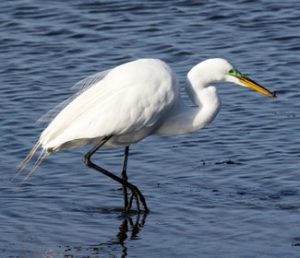Make your yard a sponge!
Perhaps the best thing any homeowner can do is make your yard a sponge! As stormwater runs off lawns, it can pick up fertilizers, pesticides, animal waste, and other pollutants and carry them into storm drains that empty into local streams and rivers. As the streams and rivers flow into the bay, they carry these pollutants with them. Instead of rainwater running off our properties into the street and down the nearest storm drain, it should be absorbed by the soil and plants in our yard.

Use the links below to learn how to improve your soil, plant native plants, and maintain a beautiful, bay-friendly lawn and garden.
Jersey-Friendly Yards is a Barnegat Bay Partnership website with information and resources to “make your yard a sponge.” By restoring soil health, fertilizing responsibly, landscaping with Jersey-Friendly plants, and following other steps to a Jersey-Friendly yard, you can help keep pollution out of the water entering the bay. The website includes a Plant Database to search for plants that match the conditions in your yard and the Interactive Yard, a fun tool for learning the steps to a low-maintenance, environmentally friendly, and healthier yard.
- Importance of Healthy Soil
- Composting — an easy and fun way to help the bay at home!
- Low-Maintenance Landscaping Guide for the Barnegat Bay Watershed (see also the Spanish version)
- Rain Gardens — learn more about this growing trend!
- Native Plants — download Going Native: A Guide to Landscaping with Native Plants in the Barnegat Bay Watershed
All of these things help to MAKE YOUR YARD A SPONGE and put rain water back into the ground where it belongs. Best of all, most of these best management practices are easy to implement and maintain, and are inexpensive or free!
Responsible fertilizer use
Fertilizers are often used to maintain a healthy by providing nutrients (nitrogen, phosphorous, and potassium) to growing grass. If fertilizers are used, they should be applied in a manner that properly protects our waterways. By following responsible fertilization practices, homeowners can have a healthy lawn and help keep nutrients from getting into the bay.
How do fertilizers impact the bay? If too much fertilizer is applied, the excess can be carried by stormwater runoff into our waterways and eventually to the bay. Once there, the nutrients in fertilizer support the excessive growth of phytoplankton and algae in the bay. This process, called euthrophication (an increase in the rate of supply of organic matter into an ecosystem), can negatively impact the bay ecosystem in many ways, such as by creating low dissolved oxygen conditions, making the water more turbid, leading to declines in seagrass, and changing the types of animals and plants that inhabit the bay.
As part of an effort to curb the potentially harmful effects associated with incorrect fertilization practices, the New Jersey legislature passed The New Jersey Fertilizer Law (A2290), which was signed into law on January 5, 2011. This law establishes statewide fertilizer standards for when and where lawn fertilizer can be applied, the amount of nitrogen that can be used for each application and for the year, and fertilizer content. The law is integral to Action # 7 (reduce nutrient pollution from fertilizer) in the Governor’s Action Plan for Barnegat Bay.
Watch the BBP video, Bay-Friendly Lawns, to get tips about growing a healthy lawn while reducing the amount of fertilizer carried into the bay.
Go to our webpage about fertilizer for a summary of the NJ Fertilizer Law and how to use fertilizers responsibly.
Related Links
American Littoral Society — “Bayscaping” for Barnegat Bay — download sample native garden designs
New Jersey Department of Environmental Protection — Creating Sustainable Landscapes
New Jersey Pinelands Commission — Landscaping/Backyard Habitat Information Center
Rutgers Cooperative Extension of Ocean County — Sustainable Landscapes Website
Rutgers Cooperative Extension of Ocean County — Gardening and Landscaping Publications
Become a Barnegat Bay Buddy — earn enough points and receive a lawn sign to display.
“Quick Facts“ about the NJ Fertilizer law.
Healthy Lawns Healthy Water — information about New Jersey’s efforts to protect our waterways from nutrient pollution.
ANJEC Stormwater Management webpage — education and outreach materials about the NJ Fertilizer Law, including a brochure, flyer, and poster.

